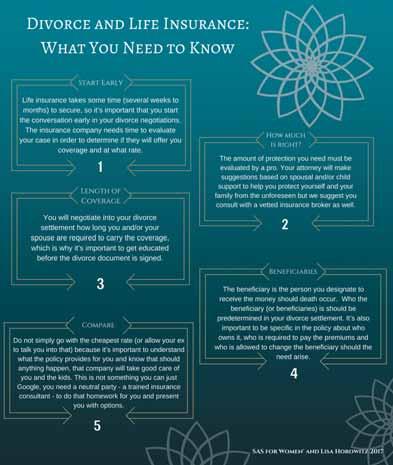
3 minute read
Divorce: What Your Clients Need to Know
They should cover all the bases by purchasing life insurance.
By Lisa Horowitz, CLU, ChFC
As a veteran insurance broker with almost 30 years’ experience, one maxim has always rung true for me: Knowledge is power. It has been my goal to bring the best available resources, tools and information to bear so that my clients can make choices and feel secure that they are making well-informed decisions.
Whenever I have given my clients relevant and practical information about products they could purchase to protect themselves and their families, decisions are made and the necessary insurance is put in place.
I have also provided my clients with important liquidity when it is crucially important. That’s what life insurance does: It keeps a family in a home, for example, and helps maintain a lifestyle the family is counting on.
Camp, school, college, vacations — all of these remain just a possibility if an unexpected death of a primary wage earner were to occur. When a client is facing a divorce, it is my job to bring these potential unbearable risks to light. It is my goal to make sure that all scenarios are considered, and that possible financial and/or insurance solutions are offered and implemented.
I have seen many clients and friends get married over the years, and I have wished them a long and happy life together. For many, however, it doesn’t end that way. Some relationships and marriages don’t last, and couples move toward separation and divorce.
This process can be emotionally overwhelming, scary even, for many people. Most of the fear is related to the idea of being alone and of facing a future without the security that being part of a couple can offer. This fear also comes from the sudden awareness that they might not have a solid understanding of the family’s finances or of their own, for that matter.
The recognition that the marriage is ending can be a crisis. It has been my experience time and time again that people become immobilized with fear when they don’t have the information they need to ensure that their financial “house” is in order.
<insert pull quote>
That’s where we, as insurance advisors, come in. Unfortunately, fear can potentially affect any decision making. We have listened to the objections some clients have to making decisions, and we understand that most of this pushback is due to a lack of understanding of the risks they are exposed to and the products that can be used to alleviate or eliminate these risks. Perhaps your clients feel bullied or pressured by ex-husbands, wives or partners, opposing attorneys/mediators, etc. Or they end up making poor decisions about finances because they don’t have the relevant facts and/or tools at hand. If they rely solely on professionals without having their own idea about what’s needed, such as the amount of income, child support, etc., that is needed, how can we help them?
Helping your clients
We can help by walking them through the process of assessing their financial needs. It’s not helpful or useful when their attorney tells them not to worry. As informed and experienced as the attorney might be, he or she is not part of the client’s daily financial life. As a financial advisor, you must be part of the process as well. This is a crucial area that requires your input as well as the client’s. We know that we succeed in selling insurance when the client is a full participant in the process. Understanding the role insurance plays in a divorce is vital to ensuring your client’s financial security and success.
Just because we know that the divorce agreement has been drawn up, the numbers are accurate and it seems as if all the parties are adequately provided for doesn’t mean all of our work as insurance professionals is done.
Clients are counting on their ex-spouse to honor the divorce agreement. But what if they suddenly were unable to do so because they die? I also ask my clients these questions: “Are you mandated to contribute to support the family? What if something unexpected were to happen to you?” “What happens to retirement and/or educational needs if the person who was required to put the funds away is no longer living?”
The primary answer to these questions is life insurance. As all advisors know, life insurance will protect all parties in the event an unexpected or untimely death occurs. The pieces of this puzzle are: How much life insurance is needed? How long is the coverage needed? Who pays the premiums? Who is the beneficiary? Who owns the policy, and why?
Below is an infographic that outlines the process one must go through to answer some basic questions about life insurance and its place in the divorce-agreement negotiations. I created it to help support the ideas mentioned in this article.
The content of this article should be addressed while your client’s Divorce/Separation Agreement is being drafted. Considerations of cost, availability of coverage, etc., should be part of any decisions pertaining to the final divorce agreement. While coming to terms about finances with an ex-husband, wife or partner is important, ensuring that the terms are actually carried out is just as vital.

Lisa Horowitz, CLU, ChFC, is founder of Lifecycles: Resource Management for Lives in Transition. Contact her at 718-352-1311







